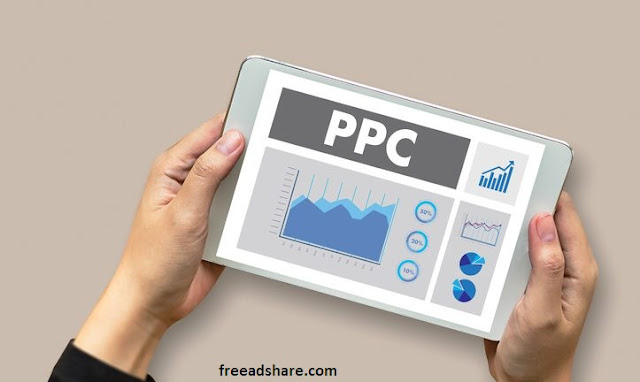What does a PPC campaign involve? It is a paid campaign that
supports business advertising initiatives and digital marketing efforts. A PPC
campaign helps roll out a new marketing campaign, promote a product release or
both. It allows businesses to reach out to new audiences and compete on a
broader scale. PPC, also known as pay-per-click advertising. This type of paid
marketing model requires marketers to pay a fee every time users click on an
ad. Pay-per-click marketing essentially helps you’ buy’ customers by enticing
them to visit your website through relevant, targeted ads. These ads usually
exist on paid platforms or search engine results and appear when someone
searches for appropriate phrases or keywords.
So, a PPC campaign is not a one-time marketing effort.
However, it provides tons of benefits if you can track and measure it
appropriately. You can check its performance by looking at various metrics such
as conversions, clicks, impressions, and much more. It also includes your ad’s
performance on multiple device types and locations. If you want to succeed in
the digital advertising realm, you have to launch a PPC campaign in the most
proper way possible. Today, we will share a step-by-step guide to help you
succeed in the paid advertising world.
Define Your Objectives
An Do Some Research
If you don’t have an end goal, your plan will never have any
direction. The same is the case with a PPC campaign. You have to start and
clarify the reasons for which you want to launch a PPC campaign. Is it to bring
more users to your website? Sign up more subscribers to your email list? You
have to define your objectives before actually spending on such a type of paid
advertising effort. If you don’t know what you wish to achieve with a PPC
campaign, chances are it will not give you the return you expect.
Furthermore, before launching a PPC campaign, you also have
to focus on your customer’s tastes. You have to find out what people are
searching for online. You can take the first steps and conduct keyword
research. Focus on buying personas or conclude customer data. It will help you
create a list of keywords you should focus on targeting.
Check Keyword Demand
With Keyword Tools
Once you have a keyword list, your next task is to validate
it. You can use a keyword checker to validate keywords
you’ve compiled during your research through their cost-per-click search
volumes, trends, competitive data. These tools also provide you with relevant
keyword suggestions to expand your already existing keyword list.
You have to upload your keyword list into such a tool in the
form of a text file or spreadsheet, and it will do the rest for you. It is a
quick, easy, and low-cost method to validate your keyword list and provides you
with valuable insights to help make your PPC campaign more effective. Also,
remember that high-ranking keywords are highly competitive, while low-ranking
keywords are less competitive. Choose wisely!
Organize Your PPC
Keywords
Once you finish validating your keywords, now is time to act
smartly and organize them according to your target audience. Taking a targeted
approach will help you group related keywords together. The more relevant and
more potent your keyword groups are, the easier it is to tweak them, measure
their performance, or create more targeted ads. When creating keyword groups, always
remember to keep the searcher’s intent in mind.
For instance, a keyword such as ‘dress’ is a broad search
term and has less purchase intent than a keyword such as ‘summer party dress.’
So, include a mix of both long-tail and short-tail keywords into your keyword
groups to compensate for the searcher’s intent.
Include Negative
Keywords
Contrary to popular belief, you should always include negative keywords in your Ad copy. You might ask
why? Aren’t negative keywords useless, and shouldn’t you avoid them? Well,
there is a caveat to using them. By adding negative keywords to your ad copy,
you will eventually filter out any unnecessary leads who search for similar
keywords. These lead to impressions that lead to no click at all. It could
weaken your ad’s quality score, negatively impacting your cost-per-click and ad
placement. By including negative keywords, you can look out for opportunities
that aren’t generating any clicks.
Define Your Budget
You have to define a budget for paid advertising efforts
because you have to pay when someone clicks on your ad. Ask yourself, can you
afford to advertise a specific keyword? Before you go any further, you need to
calculate if your PPC ads are converting. It is simple mathematics, people. You
have to focus on the profit margin, conversion rates, conversions. It will help
you define a maximum cost-per-conversion.
Let’s Suppose, on every 2000 visits- There are 60
conversions. In such a case, the conversion rate is 3 percent. Earn a profit of
300 dollars from your customers on average, with a profit margin of 30 percent.
Your maximum cost-per-conversion will be $300 * (1 – 0.30) * 3 percent= $6.3.
You should avoid spending more than that.
Figure Out Your
Competition
When you learn from your competitor’s mistakes, you will have
an excellent approach to avoid doing the same. Analyze market trends and your
competitors to analyze your PPC campaign. Various competitive analysis tools,
both paid and free, will help you help competitors running the same paid
advertising or selling similar products and services.
Create A Better Ad Copy
Now that you’ve identified your competition and compiled a
list of relevant keywords, the next step is to create a better ad copy. A
well-drafted ad copy will affect your return on investment.
Create an ad copy that has compelling headlines, descriptive lines and contains
URLs to informative websites. Personalize your ad copy so that it speaks about
your customer’s requirements, wants, and needs. As paid adverts will offer you
limited space, you have to do your best to make your copy as persuasive as
possible.
Always Track Your PPC
Campaign’s Progress
It would be best never to take a ‘launch and forget’ approach
with paid advertising. You always have to keep on your advertising efforts, be
it a PPC campaign or any other type of digital marketing technique. Without
monitoring metrics, you will never know where to adjust your strategy and what
updates to make to your ad copy.
Conclusion
As mentioned above, you cannot simply launch your PPC
campaign and pray it runs by itself. It is vital to monitor your paid ads
continuously. Only then can you identify the ad’s flaws and improvement
opportunities. From your ad copy to competitor analysis to keyword selection, everything
should be flexible enough to change with the changing marketing trends.



